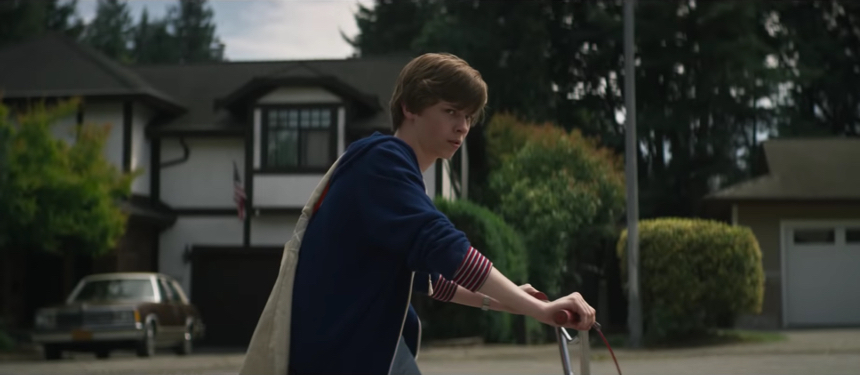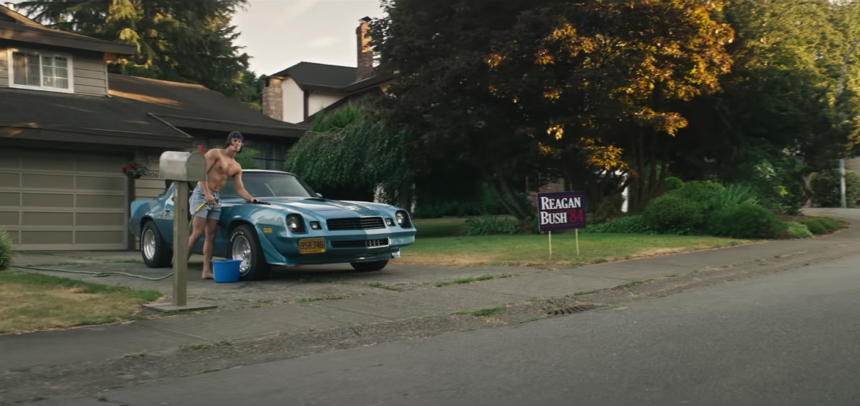Review: SUMMER OF '84 Has An Interesting Dialogue With THE 'BURBS

Be it in big cities or small towns, people have spied on their neighbours, and assumed the worst about them, since we traded a nomadic hunter-gatherer society for permanent houses.
It was, however, Alfred Hitchcock (and screenwriter John Michael Hayes) who cemented the fine cinematic tradition of snooping on adjacent residents and the suspicion of murder. 1954's New York City set suspense thriller Rear Window saw a housebound photographer with a broken leg, too much time on his hands and a good set of camera lenses peering into windows and assuming the worst. A few decades later, at the tail end of Regan-era conformity, Joe Dante (and screenwriter Dana Olsen) completely re-imagined the concept to comedic effect on the fertile satirical ground of the suburbs. The 'Burbs mixed xenophobic fears of 'the other' with idle hands and resulted in grown men devolving to suspicious petulant children who vault over fences, and toss garbage in the street, looking for incriminating evidence on the creepy family on their cul-de-sac.
There have been several other movies in the last three decades that have played in this space (the Shia LaBeouf one is, at best, forgettable nonsense), but Summer of '84 stands out by rejiggering the satire and thriller elements into a dramatic appraisal of the exploits and pursuits of teenage boys, set in an era mostly free of digital distractions. "15 is the perfect age, I wish I could freeze it for you," comments one adult, early on in the film. It is the film commenting in its way on the whole nostalgic trip by Gen Xers back into their collective cultural childhood.
The story takes place in a very specific year where the movies have catered harder than they ever have to the 15 year-old male: The Last Starfighter, The Temple of Doom, Gremlins, A Nightmare on Elm Street, and The Karate Kid. Most of these films, in the guise of slight escapist baubles, have viciously dark streaks underneath the glossy blockbuster surface. They also have a habit of putting the kids at the centre of their stories in unvarnished peril. As a result, the kids come out the other side a bit worse for wear.
This is psychological space where Summer of '84 plays. Lead conspirator, paperboy, amateur videographer, and Weekly World News enthusiast Davey is utterly convinced his neighbour is the serial killer who has been picking off kids in the leafy seaside communities surrounding Ipswitch, Oregon for the past several years. The film was actually shot in British Columbia, a few hundred kilometers north, proof enough that one place is as good as another, in Canada or the USA, as a suburban anywhere.
Davey recruits his pals and his former babysitter, on whom he now has a serious mid-puberty crush, to spy on their street's lonely white-guy bachelor. Wayne Mackey also happens to be the local cop, with a lot of weird clutter in his basement. Davey's mantra is: "The suburbs are where the craziest shit happens." Is this true, or is this simply what a bored 15-year-old kid wants to believe between games of manhunt and perusing well-worn Penthouse magazines and talking shit with his best friends?
Played by Mad Men's Rich Sommer, Wayne Makey looks like a cross between Stephen King and Jason Segel; equal portions of potential menace and casual charm. He is a little too familiar with the local kids, and a little too private in his hobbies, including a dingy basement dark-room, and an angry malfunctioning water heater (that as Tom Hanks would figure, is his own business.)
In spite of the hazy Stand By Me or Goonies boys on an adventure sentimentality, it is very much a contemporary bit of filmmaking in this regard, one that may surprise audiences expecting another go-around of Stranger Things. I tried to write this review without mentioning the ubiquitous, pandering Netflix show. Alas, I was defeated by the monstrously overrated footprint it leaves when discussing our current pop-cultural fascination with the 1980s. It is notable here, however, that the suspected terror of the neighbourhood in Summer of '84 is potentially a single white dude, and an authority figure to boot, not the immigrant or closet-Satanist at the end of the cul-de-sac. The current monster-du-jour leans more towards Incel than occult.
Davey's squad of Eats, Woody, Nikki and Faraday all want him to drop the ludicrous paranoia and the increasingly elaborate stake-outs. His friends are all, in their own way, dealing with issues of divorce and neglect in their own seemingly normal households -- says one of them, "that is why they invented curtains" -- to worry about some crazy guy killing kids. Davey is the one with the best and most engaged parents, thus has the energy to tug a bit at the loose threads in his imagination. At the risk of sounding pretentious and quote Tolstoy, happy families are all alike; but every unhappy family is unhappy in its own way.
Matt Leslie and Stephen J. Smith's screenplay reconfigures the stereotypes of the fat kid, the brainer, the sex addict and the hot girl next door, in ways that put a lot of interesting things going on in the margins of the film. It is all there in the background while the boys bluster with dirty talk and false confidence, and the parents are equal parts indifferent and absent. A particularly effective sequence involves the portly Woody easing his alcoholic mother to sleep on the couch after a 12-hour shift as a nurse followed by a date with the bottle. She slurs, "You're so good," as if surprised her latchkey son could raise himself into a caring person.
Summer of '84, despite sharing the apostrophe in its title along with The 'Burbs, is not really a comedy at all, nor is it the high energy bit of nostalgic post apocalyptic splatter and sweetness of Canadian director trio RKSS's debut film Turbo Kid. Nonetheless, it still feels informed aesthetically by Joe Dante's film. There are the various scenes of the boys breaking into Mackey's personal garden, going through his garbage bins, and eventually, his house that echo the invasions of Tom Hanks et al. Tellingly, the suspect caught by the Ipswitch cops and paraded out on the TV is named Arthur Ray Peterson, a sly reference that the screenwriters are fans. Davey himself might even be a riff on the paperboy that forms the opening credit sequence for Joe Dante's film by flinging elastic banded missiles with reckless abandon causing property damage and the adults to duck (or fling coffee.)
The movie slowly (warning: often very slowly) wiggles itself into being a coming-of-age movie along with the darker unknowns of adulthood. When the time hanging out with pals during those endless summers begins to give way to the burden and responsibility of figuring out things on your own: The coalescing reality of 'the future' vis-a-vis the loss of notions of free-wheeling childhood. Where things never work out they way you saw them in your head.
This is a surprising theme for RKSS's sophomore film, but an effective one. François Simard, Anouk Whissell, and Yoann-Karl Whissell practice restraint and control over sugar rush. They light and block each scene to let the story and plot build and build, all the while, pushing any surface impressions of nostalgia into something less commercial but more inquisitive. The endless, and often tedious, teenage-boy humour might be a bit much at times, but the film does commit to spending time with the characters and their horny-clueless sensibilities.
Summer of '84 thankfully avoids the trap of being 'too 1980s' by focusing less on talking about movies or pop culture (there is some), wallowing in wood panel production design, or having the characters playing Colecovision (the video game unit thankfully remains boxed for the duration of the film.) It's focus is more on the headspace of its characters, and their hopes and issues -- and soon-to-be-displaced dreams. I love the ending of this film for breaking with any notion of tradition of the genre. It is very much its own thing, even if the film often does take the more familiar path to get there.
Maybe the craziest shit does happen in the suburbs, but really, if you think about it, the craziest shit happens everywhere, all the goddamn time, be it the 1950s, the 1980s, the 2010s. It is how we deal with it, how we process it, and how we grow beyond it that changes a bit with each generation. In general, we only see what is in front of us, and only then, if we are looking without our own prejudices, bias, and personal crazy shit.








